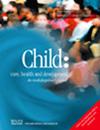Development and Psychometric Testing of a Physical Activity Parenting Practices Questionnaire for Chinese Youth
Abstract
Background
Ensuring consistency in both conceptualization and operationalization of physical activity parenting practices is vital for translating insights on parental influences into effective intervention. This study aimed to develop a psychometrically sound measure for comprehensively assessing Chinese parents' parenting practices regarding early adolescents' physical activity.
Methods
A total of 70 measurement items were developed from translating, adapting and revising the Physical Activity Parenting Practice (PAPP) item bank. Content validity was assessed via consultation with 10 experts and cognitive interviews with six 7th graders. The psychometric properties assessed included structural validity via exploratory factor analysis and confirmatory factor analysis, internal consistency, predictive validity against adolescent-reported physical activity levels and test–retest reliability of construct scores over 2 weeks. The sample comprised 725 adolescents aged 12–15 years, of whom 114 completed the survey twice, 2 weeks apart.
Results
Eight PAPP constructs from the control, structure and autonomy support domains were identified forming a set of 49 measurement items. The structure within each domain demonstrated good model fit and comparable alignment with the international conceptual framework. The Cronbach's alpha coefficients of each construct ranged from 0.70 to 0.90. Five construct scores had significant positive associations with adolescents' physical activity levels (β ranged from 0.14 to 0.43, p < 0.001). Test–retest construct scores generated moderate to large correlations with coefficients ranging from 0.60 to 0.80.
Conclusion
Psychometric testing supported the reliability and validity of the physical activity parenting practice questionnaire for Chinese youth (CYPAPP). This culturally adapted measure would enable cross-cultural comparisons to better understand parental influences on adolescents' physical activity.

 求助内容:
求助内容: 应助结果提醒方式:
应助结果提醒方式:


